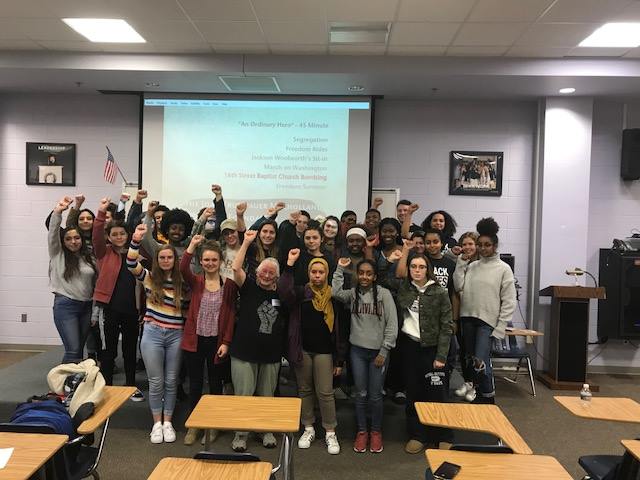“The most important audience is the one that’s there,” I told my mother before we went on stage in Puyallup, WA. That night it was a full house with several hundred people. Another night, in Ohio, only 15 students showed up to listen to my mother speak. In Utah, it was 2,000.

The other night in Idaho, I sat there and listened as a lady poured out her heart in a room with 50 people. She wanted to know how to get through to people who don’t want to listen. Her father, an elderly man, just didn’t believe in institutional racism. It’s a frustration I’ve heard time and time again… when it all seems so obvious to us but completely abstract to the person you are talking to.
“Meet them where they are,” is how I responded. “Too often we assume they should already know what we know and then become frustrated when they don’t see, or don’t want to see, the obvious.”
I recently spoke at the National Council for the Studies Studies annual conference in San Francisco, CA. After my presentation titled, “The History of Racism and How to Talk About it” a well respected teacher of twenty years approached me and said, “I always just assumed that when we talked about Dr. King and Rosa Parks that the students understood what is and isn’t racist. I didn’t think that I should actually talk to them about not being racist and what that means.”
We should never attack someone’s intelligence level on a subject. For one, it’s rude and also arrogant but, just as important, when we do respond in that fasion the person we are trying to reason with will simply put up their defensive walls and dig in on their position even more. We need to be willing to have the patience to ask the questions and listen for the answers and walk someone through it all.
One day, I had someone ask me if the Confederate Flag was racist. Now, to me, the answer should be as plain as the nose on your face but instead of firing back at the person I asked this person a question, “What does the Confederate Flag represent?” His response floored me. He said, “I don’t know.” Wow! Instead of making the person feel ignorant I proceeded to have a conversation with him and by the end of it he understood why it was racist.
In 2013, my mother and I were at a screening of our award-winning film, “An Ordinary Hero” at Ole Miss in Oxford, MS. Afterwards several college students came up to me and said, “We never learned any of this.” I said to them, “How is this possible? 80% of this movie takes place in your state?” My knee jerk response in my head was, “Well, this is Mississippi, of course they don’t teach this.” I didn’t know the Civil Rights Movement really isn’t taught anywhere. Sure, we learn about Dr. King and Rosa Parks but that’s it. I had grown up on a steady diet about the Movement what with all my mother’s friends coming over and talking about the “old days”.
The lady at the screening in Idaho thanked me for my response although I knew it didn’t seem to help. The next question was asked and said, “Before I answer that question I need to say something else.” I turned back to the lady and said, “My grandmother went to her grave believing she was superior to people of color. Her daughter, my mother, is a Civil Rights Hero. My mother could never convince her mother that we are all equal. While she could never get through to her she made sure we were raised to think differently. She would even shield us from our grandmother by reminding her that there were certain things she was not allowed to say to us about race. She couldn’t change the past but she was going to definitely change the future. I see you’ve brought your daughter with you tonight. You might not be able to change the way your father thinks but you are definitely having an impact on your daughter.”





Leave a Reply
You must be logged in to post a comment.